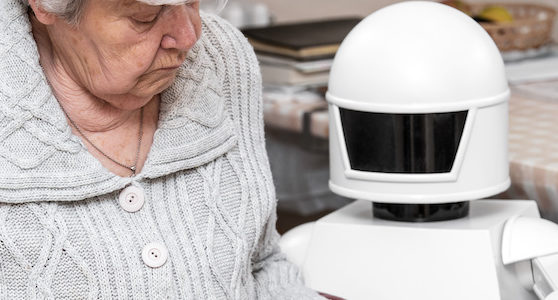Robots may be worthless at doing laundry and rubbish at walking on variable terrain, but there’s one task they keep getting suggested for, no matter how many times they disappoint: elder care.
In multiple countries around the world, robots are being tried out for physical and emotional tasks involving taking care of old people. The latest entry is ElliQ, a robot described as “lamp shaped.”
ElliQ doesn’t wait as Alexa does to be spoken to, but initiates conversations with owners. ElliQ can call for an Uber, encourage people to exercise, and monitor their homes on behalf of relatives.
If their owner has been in the bathroom for an unusually long time, or fails to go to bed at night, ElliQ can alert their relatives. It’s theoretically possible to connect her with sensors that check urine for signs that the owner is not taking medications as prescribed, or hasn’t bathed in a while.
How much is too much?
Previous elder-care robots have been comforting like a teddy bear or responded to speech like Alexa.
Buddy, a French robot specifically designed by makers Trialog to provide interaction as well as practical assistance for elderly people, can remind elderly people to take medication and facilitate FaceTime with family members.
But ElliQ takes things a step further, prompting ethical concerns.
Since they don’t wait for a “wake word” as Alexa and similar personal assistants do, devices like ElliQ essentially have their owners under surveillance all the time. Caregivers can set up the system, so the owner may not have given consent for ElliQ’s interference.
On the other hand, an elderly person may be able to live independently for longer with robotic help.
Replacing human contact?
While makers of eldercare robots often point to research that shows the dangers of loneliness in the elderly, researchers found that the most common ethical question about robots that care for old people is the fear that robots will be used to replace human interaction.
If they feel confident that ElliQ will alert them to any life-threatening situation, will relatives feel free to ignore aging relatives? Will neighbors stop checking in?
While researchers have discussed the question, we found no research on whether the use of “carebots” actually reduces the amount of human contact the cared-for individuals receive.
Haves and have nots
Another ethical question researchers encountered was the problem of access: not all elderly people can afford a companion robot. Doctors now are likely to assume that elderly patients have smartphones or assistants like Alexa and may not be as concerned about their living alone as they were in the past. If carebots become commonplace, will this change expectations in ways that might lead to endangerment for less affluent patients?
There aren’t that many ethical quandaries in manufacturing wit h robots. If your Indramat drive and control systems need service or support, that’s not a quandary, either. We can provide factory repair and reman with fast turnaround. Call for immediate assistance.
